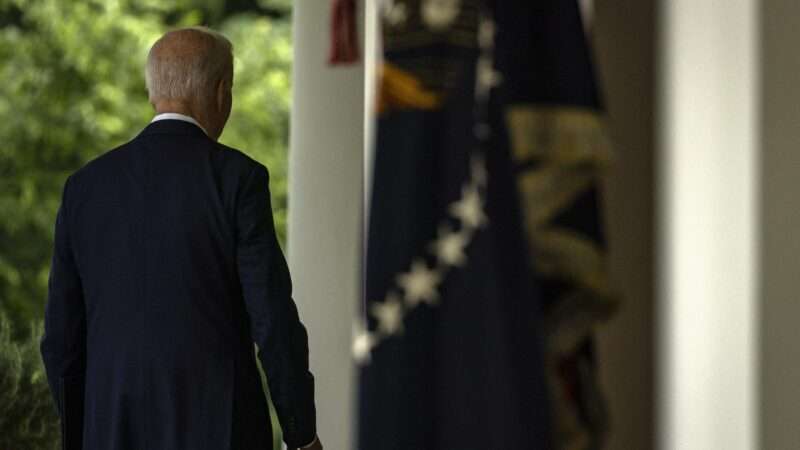
As he signed a sweeping executive order in July 2021 intended to crack down on anticompetitive business practices, President Joe Biden declared that "capitalism without competition isn't capitalism, it's exploitation."
That would become something of a catchphrase for Biden's presidency—and a mission statement for his appointees. Biden's Justice Department blocked the merger of JetBlue and Spirit Airlines on the grounds that consumers would be harmed by the consolidation of the budget airline industry. At the Federal Trade Commission, Biden-appointed Commissioner Lina Khan launched a crusade against all sorts of mergers and acquisitions. "Capitalism without competition isn't capitalism," Biden reminded everyone as he announced plans to goose competition in the meat processing industry in 2022.
As he heads for the exit, however, one of Biden's final executive actions lays the groundwork for a massive consolidation of the American steel industry. In blocking U.S. Steel's acquisition by Nippon Steel, Biden apparently tossed his concerns about competition and consolidation out the window.
At first blush, that might seem counterintuitive. How can preventing a merger lead to greater consolidation?
The answer lies in the third party that played a major role in blowing up the U.S Steel/Nippon Steel deal: Cleveland-Cliffs, the Ohio-based steelmaker that lost to Nippon in the bidding war to buy U.S. Steel.
It is widely assumed that Cleveland-Cliffs will be able to purchase U.S. Steel (probably at a steep discount) if the deal with Nippon does not go through, and that likely explains why Cleveland-Cliffs has lobbied so hard to tank the deal. The company pulled together an unconventional alliance of politically connected allies, including labor unions and environmental groups, to bolster its own significant lobbying efforts.
If Cleveland-Cliffs ends up buying U.S. Steel, it will enjoy a near-monopoly on a variety of steel products produced in America. Combine that with the fact that tariffs and other trade barriers make it more expensive to import steel, and it means steel-consuming industries will have few options for supplying their needs.
That is, of course, exactly what Cleveland-Cliff is counting on. "A Cleveland-Cliffs-U.S. Steel combo would control 100% of U.S. blast furnace production, 100% of domestic steel used in electric-vehicle motors, and 65% to 90% of other domestic steel used in vehicles," wrote The Wall Street Journal's editorial board on January 3. "Cleveland-Cliffs CEO Lourenco Goncalves lobbied the White House to block the Nippon deal because he wants to create a steel-making cartel shielded from foreign competition by tariffs and Buy America rules."
A good deal if you can get it—but an outcome that flies directly in the face of the Biden administration's yearslong campaign against corporate monopolies.
In a lawsuit filed Monday challenging Biden's decision to block the deal, U.S. Steel and Nippon Steel point out that Cleveland-Cliffs' top brass have not exactly been shy about their anticompetitive goals.
A part of the lawsuit alleges that Cleveland-Cliffs' senior vice president of finance told investors that blocking the Nippon deal "would result in 'less competition' and 'one less competitor pushing down prices.'"
Separately, the lawsuit claims that Cleveland-Cliffs CEO Lourenco Goncalves told investors in 2023 that being the sole American supplier of certain steel products would "push prices up."
"If this illegal campaign succeeds, the American economy and American consumers will face significant harm as a result of a reduction of competition in key steel markets," the lawsuit claims.
That is exactly what Biden and his allies have been warning about since taking office: that greater corporate consolidation will harm consumers and allow businesses to engage in price gouging and other unscrupulous, anticompetitive practices.
The big difference is that, this time, Biden's labor union allies are happy about the consolidation. United Steelworkers International President David McCall praised Biden's decision to block Nippon's purchase of U.S. Steel, and the union's bosses have been trying to silence rank-and-file members who recognized the benefits of Nippon's purchase—like the Japan-based company's promise to invest $2.7 billion in upgrading U.S. Steel's plants.
That makes it seem like Biden was willing to discard one of his administration's top economic policy goals just to do a favor for the steelworkers' union. As is too often the case, it seems like the only monopolies that earn government approval are the ones it helps create.
The post With U.S. Steel Decision, Biden Turned His Back on Opposing Monopolies appeared first on Reason.com.







